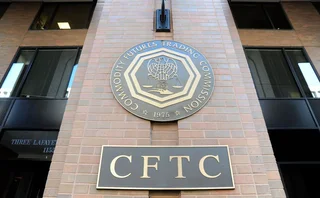
Scrutiny on pay continues

Eyebrows were raised in May when Deutsche Bank chief executive Joseph Ackermann said the bank was considering adopting multi-year bonus schemes to replace the industry standard annual assessments. While no specific details were given, Ackermann - who also serves as the chairman of the International Institute of Finance (IIF) - is the first bank chief executive to publicly acknowledge changes are needed to better align incentives with the risks taken.
Senior regulators have linked the repeated cycles of boom and bust in the financial sector with short-term incentives provided to bank risk-takers. "Financial crises have been a regular and disturbing feature of our and other developed economies for as long as anyone can remember," said Bank of England governor Mervyn King at the British Bankers' Association conference on June 10. "Are these repeated crises the inevitable result of human nature at work in financial markets, with greed and fear alternating as sentiment swings from irrational optimism to irrational pessimism? Or is it the failure to find the right incentive structure for banking markets?"
In a speech at the Investment Management Association's annual dinner in May, Hector Sants, chief executive of the UK's Financial Services Authority, said: "It is important for boards to recognise that having asymmetrical structures where employees receive immediate reward and do not bear the consequence of losses is a risk to shareholders."
Sants advocated the use of deferred compensation policies and greater use of share options. The inference is that if bankers' bonuses were linked to long-term performance, they would be less likely to take excessive short-term risks.
If the IIF truly represents the consensus view of banks, changes to incentive structures may become more than idle chatter. In its interim report on market best practices released in April, the IIF supported the view that compensation should be "related by deferrals or other means to shareholders' interests and long-term, firm-wide profitability".
According to Richard Clayton, research director at CtW Investment, a shareholder activist group based in Washington, DC, short-term bonus structures contributed to two major asset price bubbles experienced in the US in the past decade - the tech sector boom in the late 1990s and more recently the residential mortgage market.
Commitment
"You need a commitment on the part of directors to ensure there is a conscious effort to take into account potential long-term risks and losses and not unduly reward short-term performance," says Clayton. "Shareholders need mechanisms at their disposal, as well as an understanding of potential price bubbles, so they do not unduly reward short-term performance, which is a function of temporary conditions."
The calls for changes have struck a chord within the risk management fraternity. "One of the worst things for a bank is when a trader puts on a significant position that is profitable on day one, but only later does someone realise the position has not been properly marked," says Simon Gurney, London-based chief risk officer (CRO) for the UK and Europe at Standard Chartered Bank. "The only way you can address this is to make sure everyone's interests are aligned. If the interests of traders and structurers are aligned with the rest of the firm, logically they will think more prudently before putting assets on to the balance sheet."
Carl-Johan Granvik, Helsinki-based CRO at Nordea, concurs with that view, but says it could be some time before an institution attempts such a move. "It would be difficult to establish industry-wide rules, but we do need to look at long-term incentive schemes," he asserts. "I don't think we will see the cash dimension to compensation completely eliminated, but big bonuses to senior managers and traders should increasingly be based on stock options. However, it is unrealistic to think it can be changed overnight - you need to recognise banks are fighting for the same resources with hedge funds, private equity firms and other investment vehicles."
Realistically, no firm would attempt to go it alone in adopting long-term incentive schemes for fear of an immediate exodus of talent. There would need to be a collective agreement to adopt such a move, but trying to implement changes across jurisdictions poses further challenges.
"I think most banks agree with the suggestion we need to look at longer-term incentives - but we still have to find an effective way to do it, taking into account the legal implications of such a move," says Hugo Banziger, Frankfurt-based CRO at Deutsche Bank.
Although regulators in Europe and the US have been publicly critical of bank compensation practices, there has been no indication they will force a change. Consequently, some in the market believe the issue of incentives will die down as soon as market conditions improve.
"Removing the trader's option - which means they get paid handsomely in good times and bad - is laudable. But it would need to be an industry-wide initiative - which means of course it will never happen," believes a London-based CRO at a global banking giant. "And no individual firm would try and change things unilaterally because they would lose all their talent."
- Rob Davies.
Only users who have a paid subscription or are part of a corporate subscription are able to print or copy content.
To access these options, along with all other subscription benefits, please contact info@risk.net or view our subscription options here: http://subscriptions.risk.net/subscribe
You are currently unable to print this content. Please contact info@risk.net to find out more.
You are currently unable to copy this content. Please contact info@risk.net to find out more.
Copyright Infopro Digital Limited. All rights reserved.
As outlined in our terms and conditions, https://www.infopro-digital.com/terms-and-conditions/subscriptions/ (point 2.4), printing is limited to a single copy.
If you would like to purchase additional rights please email info@risk.net
Copyright Infopro Digital Limited. All rights reserved.
You may share this content using our article tools. As outlined in our terms and conditions, https://www.infopro-digital.com/terms-and-conditions/subscriptions/ (clause 2.4), an Authorised User may only make one copy of the materials for their own personal use. You must also comply with the restrictions in clause 2.5.
If you would like to purchase additional rights please email info@risk.net
More on Regulation
US Basel equivalence questioned as EU patience wears thin
MEPs say unfaithful US implementation of Basel III could trigger review of access to EU markets
The Term €STR transition: challenges and market readiness
The progress, challenges and factors shaping the adoption of Term €STR as financial institutions transition from Euribor
CFTC takes red pen to swaps rules, but don’t call it a rollback
Lawyers and ex-regs say agency is fine-tuning and clarifying regulations, not eliminating them
EU edges closer to calming FRTB fund-linked fray
Dealers say temporary solution is a step in the right direction but won’t fully resolve all issues
European Commission changes tune on proposed FRTB multiplier
Banks fear departure from original diversification factor undermines case for permanent relief
Supervisors should be mindful of geopolitical risks, says IMF
Shock events cause sizeable swings in asset pricing, institution’s latest report highlights
Bowman won’t commit to stress-testing the tariff shock
Nominated Fed vice-chair stonewalls calls to run ad hoc scenario similar to 2020 Covid test
Fed’s Bowman to ‘prioritise’ SLR exemption for US Treasuries
Reinstating Covid-era relief is a ‘no brainer’, dealers say, as bond markets reel from tariff chaos







